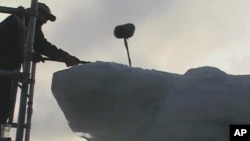It started out as a nine ton block of ice... inside, a bronze skeleton modeled on a full-size male polar bear. It's called the bear in the square, the brainchild of artist Mark Coreth. He says this piece of work is more about the melting ice of the Arctic than polar bears.
"When you touch that ice bear, you're touching the Arctic, you're touching the whole of that problem and what I hope is people will touch the bear, touch the Arctic, will get an understanding for the problem up there and ultimately become part of the solution," he said.
Even while sculpting, Coreth tries to get everyone involved. He was inspired when visiting a remote Inuit community in Northern Canada, and now wants to share his experiences of seeing polar bears and the Arctic.
Explorer Pen Hadow led a two-and-a-half-month trek earlier this year that revealed Arctic ice is melting faster than previously thought. The bear he says brings that message home.
"It gives people an opportunity to connect with literally the processes that are going on up on the sea ice of the Arctic Ocean around the North Pole which is melting," said Hadow.
As Coreth put the finishing touches on his work, the sun was getting high.
"He's already melting, he's already beginning to tell his message," explained Coreth.
While this work isn't about polar bears specifically, the melting Arctic does mean they're threatened. The Arctic ice is their main habitat, and when it goes, their numbers are expected to drop dramatically, says Colin Butfield - the campaign's director for the World Wildlife Fund.
"Because it's happening so quickly, they haven't had time to adapt and change, if you imagine a climate changing over hundreds of thousands of years, bears and other animals would gradually move into other habitats, but because this is going to happen over decades, it will be too fast for them to adapt and look for other food sources," said Mr. Butfield.
This is a hands-on piece of art. The public is encouraged to touch it. The heat of their hands, likely to accelerate the melting process. In the end, all there will be is a giant puddle of water, the bronze skeleton and plaques -- a kind of testimony to the crisis of climate change.
There's another bear just like this in Copenhagen because the idea behind this whole exercise is to keep up pressure on negotiators at the climate conference to come up with a deal.
News
'Copenhagen' Ice Sculpture Melts Hearts in Central London
update

With negotiators trying to hammer out a deal on climate change in Copenhagen, a sculptor in London is creating a piece of art to mirror the melting ice in the Arctic. His ice sculpture of a polar bear is designed to melt by the end of the Copenhagen Conference, leaving behind a brass skeleton, and a big puddle of water.



